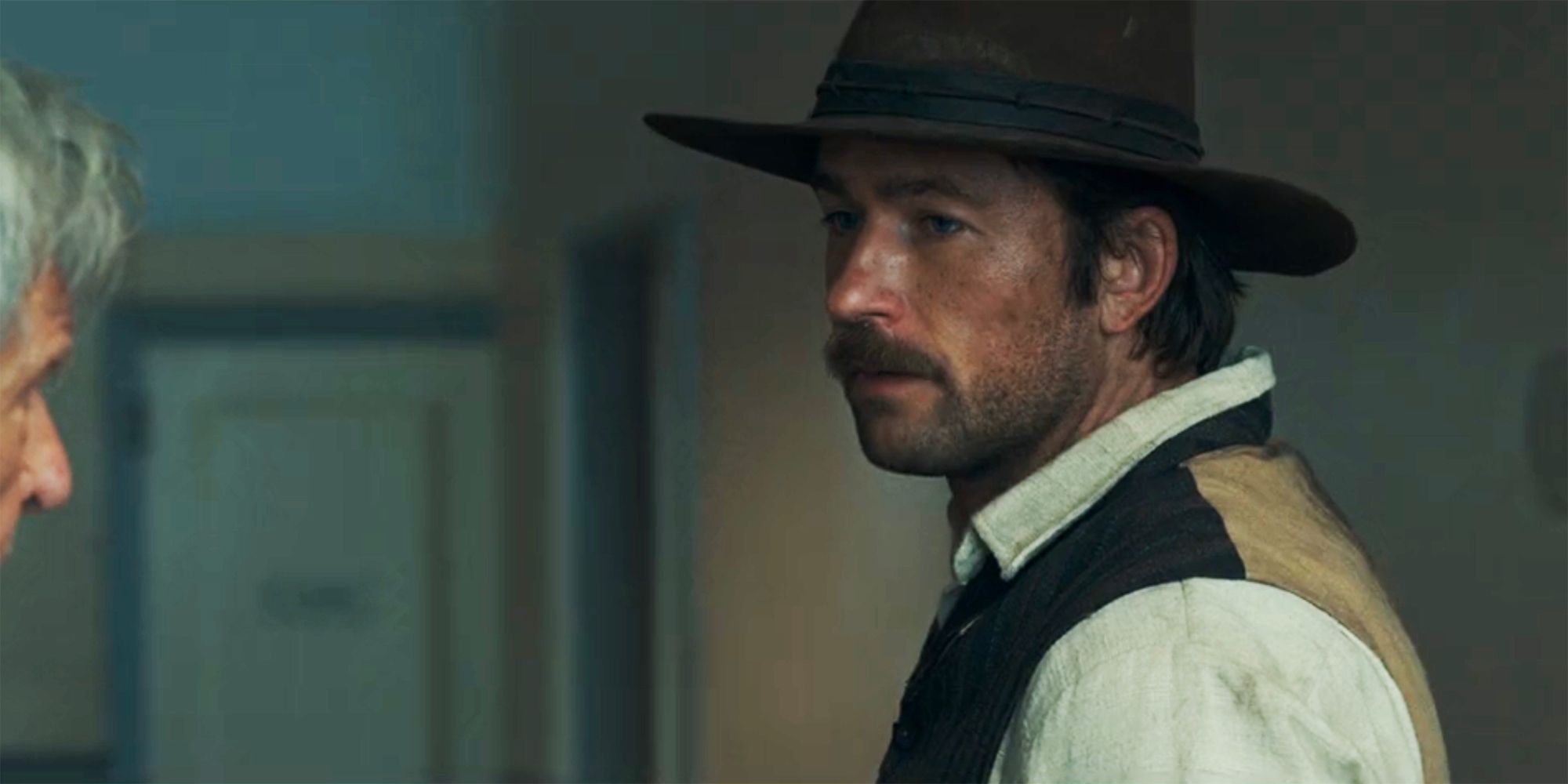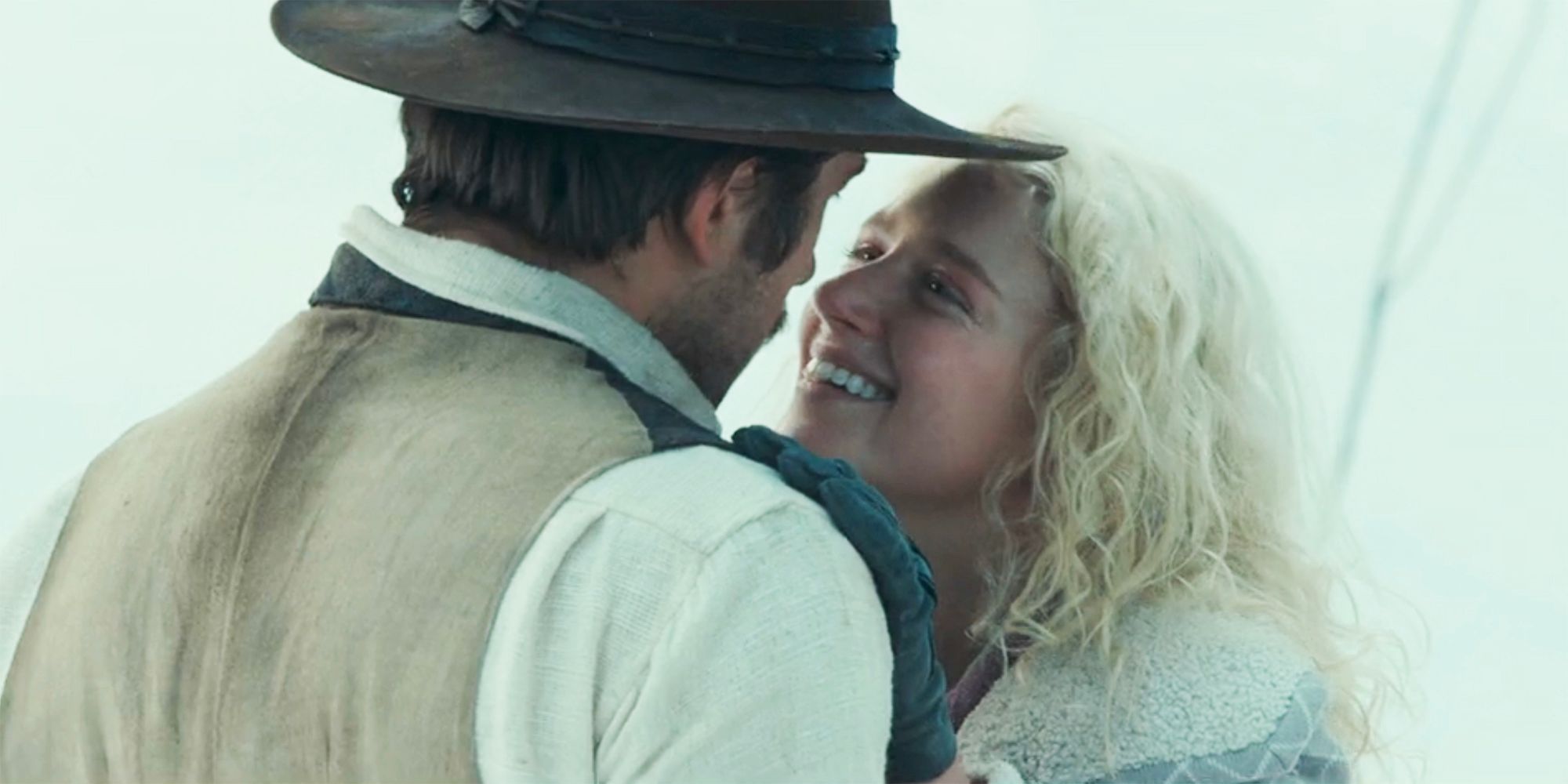The tactical conflict of 1923′s finale didn’t disappoint, with Jacob and his crew engaging in a shootout at the station with Whitfield’s men. The tension prompted Spencer to get off the train and head to the Yellowstone Ranch, where he finished off Banner’s army.
However, as her husband defended his family’s legacy, Alex Dutton succumbed to a horrible death in 1923’s finale, dying of hypothermia complications after she delivered her baby, whom she named John.
After Alex’s death, Spencer goes directly to Whitfield’s mansion with Jacob. Killing the man attacking his family made sense, but Spencer’s reasoning for killing Whitfield did not track.

Spencer Blames Whitfield For Alex Dutton’s Death In 1923 Season 2’s Finale
Spencer Kills Whitfield Vengefully In 1923 Season 2, Episode 7
When he asks his aunt about who led the attack against their family, Cara points Spencer to Donald Whitfield, and the war hero understandably wants to go after the assailant.
The morning after Alex passes away, Spencer unites with Jacob to fight the last battle in the family’s range war after bestowing his newborn baby to Cara. Spencer and Jacob proceed to storm the mining tycoon’s lavish mansion. When they arrive, Whitfield is dining with Lindy (Madison Elise Rogers) and Mabel (Virginia Gardner), removed completely from the bloody warfare that he sanctioned.
Spencer wounds Whitfield upon entering his dining room, and he fatally shoots Lindy as she rises to defend him. James Dutton’s (Tim McGraw) youngest son goes on to explain to Whitfield that he killed his wife.

While Donald insists he isn’t responsible, saying he doesn’t know Spencer’s wife, Dutton isn’t interested in what Whitfield has to say, other than getting the mining tycoon to repeat Alex’s name. When he asks Alex’s name, further questioning the war hero’s attack, Spencer shoots Whitfield in cold blood. Still, while Spencer has a plethora of reasons to blame Whitfield, Alex’s death isn’t among them.
Brandon Sklenar’s Reasoning For Spencer Blaming Whitfield For Alex’s Death Explained
Spencer Wrongfully Blames Whitfield For Prompting His Journey Home
Spencer blaming Whitfield for his wife’s death didn’t resonate with some viewers, and there’s a reason for that. Still, Brandon Sklenar explained that the confusion was due to creative decisions in an interview with the Hollywood Reporter.
He explained that quite a bit of dialogue was cut from Spencer Dutton’s scene with Whitfield. The star explained that the missing dialogue evoked an emotional moment for Spencer, and a creative decision was made that the follow-up to Spencer’s tragedy didn’t require the same emotional punch, with a longer monologue getting cut:
There was a bit of dialogue that I had in that [confrontation] scene, but we cut it out. Spencer was incredibly emotional during that bit of dialogue, and we had already had this emotional moment with Alex.
So it just felt like the balance would’ve been off, and they felt it was more effective to go right to the point with Whitfield. They felt that people would feel that and understand why without having to spell it out.
But initially, there was a bit of dialogue where Spencer essentially said the same thing: “You came after my family, and that forced me home.” He went through the chain of events as far as why he feels that Whitfield is responsible. So I think the fans of the show can understand why it’s Whitfield, without us fully explaining it, as you have.
None of this would have happened had Whitfield not come after the Dutton family. Alex would not have followed Spencer home, and she would not have gotten stranded in the snow. His family also wouldn’t be in the position they’re in, and Spencer wouldn’t be on this war path where he’s now standing there with a gun at Whitfield’s head. So it is his fault.
Brandon Sklenar explained that Spencer blamed Whitfield because the tycoon came after his family. Donald’s war on the Duttons forced Spencer home, with Cara writing the war hero that he needed to return, and her nephew ultimately heeding her call when he finally read the letter.
The attack on the Dutton family exacerbated the awful things happening to Alex Dutton in 1923, with the couple enduring life-threatening obstacles on their journey home, even before their separation at the end of 1923 season 1. While Sklenar is right that the war brought him home, he’s wrong about a pivotal detail.
Spencer Blaming Whitfield For Alex’s Death Still Makes No Sense
Banner Is The One Who Prompts Spencer’s Return
While it made for a dramatic ending, a closer look at 1923 season 1 reveals that Whitfield had absolutely no involvement whatsoever in Alex’s death, even with Sklenar’s justification. Whitfield knew nothing about the initial attack on the Dutton family in 1923 season 1, episode 3, which killed John Dutton I (James Badge Dale) and almost killed Jacob Dutton.
The villain isn’t introduced until 1923 season 1, episode 4, when Banner goes to his new partner after Creighton attacks the Dutton family over a dispute about his sheep. Banner asks Whitfield for an army, involving Donald, after the initial attack.
By the time Banner goes to Donald in 1923 season 1, episode 4, Spencer’s brother is already dead. Spencer’s uncle, Jacob, has already suffered life-threatening injuries after Banner shoots him in the chest multiple times with a Tommy gun. Spencer’s aunt had already written to him, urging her nephew to come home due to the rising tension at the ranch, putting his legacy in peril. All these events are what prompted the end of Spencer and Alex’s vacation, pulling them away from their cozy seaside hut in Zanzibar, Tanganyika, and they happened before the Scottish sheep herder ever involved Whitfield.
Brandon Sklenar’s response further confuses Spencer’s reasoning, wrongfully saying Whitfield prompted his journey home
Donald Whitfield getting involved in the Dutton family’s conflict after Cara sends word to her nephew is why Spencer’s claim feels out of place. While he certainly has it out for the family, Whitfield has nothing to do with Spencer coming home.
Banner is the one who instigated the war; Whitfield just exacerbated the conflict by supporting Creighton’s second, more drawn-out attack.
While Whitfield is certainly responsible for Spencer’s anguish, causing him to separate from his wife to fight a war as she delivered their baby, Brandon Sklenar’s response further confuses Spencer’s reasoning, wrongfully saying Whitfield prompted his journey home.
How 1923 Could Have Fixed Spencer Dutton’s Finale Scene With Donald Whitfield
Spencer Could Have Found Something Else To Blame Whitfield For
It makes sense that Yellowstone screenwriter Taylor Sheridan wanted to send 1923 off with a bang, and Spencer’s team-up with Jacob certainly delivered that.
The pair walking out of Whitfield’s mansion as a fire engulfs its remains is an epic 1923 moment, with stunning visual effects. However, a tweak to Spencer’s dialogue would have made the moment more impactful thematically, with Spencer properly placing blame on Whitfield to justify his scorn. Spencer, using a different reasoning for his attack on Whitfield in his home, could have preserved the scene while raising fewer eyebrows.
Maybe if Spencer had been with Alex, the outcome could have been different, giving Dutton plenty of reasons to blame the family’s nemesis.
While Whitfield wasn’t responsible for Alexandra of Sussex’s fate, he indeed caused Spencer’s family strife. Spencer could have blamed Whitfield for coming after his family more generally, which warranted the anger Spencer felt in their scene.
Spencer also could have focused on how Whitfield’s attack at the train station caused him to get separated from his wife, again, as she delivered their child. Maybe if Spencer had been with Alex, the outcome could have been different, giving Dutton plenty of reasons to blame the family’s nemesis. Instead, Sklenar’s explanation further muddles 1923’s inconsistency, ruling out more vague interpretations.
Source: Hollywood Reporter
Why Spencer Dutton Blaming Whitfield For Alex’s Death In 1923 Still Makes No Sense Despite Brandon Sklenar’s Explanation
Spencer Dutton in a close up in 1923’s finale
Alexandra and Spencer in 1923
Alex and Spencer with John Dutton II in 1923 season 2 finale